Abstract
The species of the damselfly genus Wahnesia Förster, 1900 occurring in the D’Entrecasteaux Islands, Louisiade Archipelago, and on Woodlark Island are reviewed, and four new species are described: W. muyuw from Woodlark Island, W. misima from Misima Island, W. tagula from Tagula (Sudest) Island, and W. rossel from Rossel Island, these latter three islands all lying in the Louisiade Archipelago. In addition, new information is presented on the identification and distribution of the two previously described species from the D’Entrecasteaux islands: W. annulipes (Lieftinck, 1956) from Goodenough, Fergusson, and Normanby islands, and W. armeniaca (Lieftinck, 1956) from Goodenough and Fergusson islands. Illustrations are provided for the male abdominal terminalia and genital ligula of the four new species, as well as the wings and a color photograph of a live male of W. muyuw, and the ligula of W. armeniaca, accompanied by updated distribution maps for all species treated.
References
Abers, G.A., Ferris, A., Craig, M., Davies, H., Lernier-Lam, A.L., Mutter, J.C. & Taylor, B. (2002) Mantle compensation of active metamorphic core complexes at Woodlark Rift in Papua New Guinea. Nature, 418, 862–865. https://doi.org/10.1038/nature00990
Brass, L.J. (1956) Results of the Archbold Expeditions No. 75. Summary of the Fourth Archbold Expedition to New Guinea (1953). Bulletin of the American Museum of Natural History, 111, 83–151. https://doi.org/10.5962/bhl.title.141745
Brass, L.J. (1959) Results of the Archbold Expeditions No. 79: summary of the Fifth Archbold Expedition to New Guinea (1956–1957). Bulletin of the American Museum of Natural History, 118, 7–69.
Hamilton, W.B. (1979) Tectonics of the Indonesian region. U. S. Geological Survey Professional Paper 1078. U. S. Government Printing Office, Washington, D.C., 345 pp. https://doi.org/10.3133/pp1078
Kalkman, V.J. & Theischinger, G. (2013) Generic revision of Argiolestidae (Odonata), with four new genera. International Journal of Odonatology, 16, 1–52. https://doi.org/10.1080/13887890.2012.749450
Kalkman, V.J., Dijkstra, K.-D.B., Dow, R.A., Stokvis, F.R. & Tol, J. van (2018) Out of Australia: the Argiolestidae reveal the Melanesian arc system and East Papua composite terrane as possible ancient dispersal routes to the Indo-Australian archipelago (Odonata: Argiolestidae). International Journal of Odonatology, 21, 1–14. https://doi.org/10.1080/13887890.2017.1402825
Lieftinck, M.A. (1956) Revision of the genus Argiolestes Selys (Odonata) in New Guinea and the Moluccas, with notes on the larval forms of the family Megapodagrionidae. Nova Guinea, New Series, 7, 59–121.
Lieftinck, M.A. (1971) A catalogue of the type-specimens of Odonata preserved in the Netherlands, with a supplementary list of the Odonata types described by Dutch scientist deposited in foreign institutional collections. Tijdschrift voor entomologie, 114, 65–139.
Paulson, D. & Schorr, M. (2021) World Odonata list. Last revision 1 May 2021. Online on the internet. Available from: http:// www.pugetsound.edu/academics/academic-resources/slater-museum/biodiversity-resources/dragonflies/world-odonata-list2 (accessed 1 May 2021)
Pigram, C.J. & Davies, H.L. (1987) Terranes and the accretion history of the New Guinea orogen. Journal of Australian Geology & Geophysics, 10, 193–211.
Polhemus, D.A. & Polhemus, J.T. (1998) Assembling New Guinea: 40 million years of island arc accretion as indicated by the distribution of aquatic Heteroptera (Insecta). In: Hall, R. & Holloway, J.D. (Eds.), Biogeography and Geological Evolution of SE Asia. Backhuys Publishers, Leiden, pp. 327–340.
Polhemus, D.A. & Polhemus, J.T. (2004) Two new genera and thirty new species of Microveliinae (Heteroptera: Veliidae) from the East Papua Composite Terrane, far eastern New Guinea. Tijdschrift voor Entomologie, 147, 113–189. https://doi.org/10.1163/22119434-900000146
Wallace, L.M., Ellis, S., Little, T., Tregoning, P., Palmer, N., Rosa, R., Stanaway, R., Oa, J., Nidkombu, E. & Kwazi, J. (2014) Continental breakup and UHP rock exhumation in action: GPS results from the Woodlark Rift, Papua New Guinea. Geochemistry, Geophysics, Geosystems, 15 (11), 4263–4288. https://doi.org/10.1002/2014GC005458
Webb, L.E., Baldwin, S.L. & Fitzgerald, P.G. (2014) The Early-Miocene subduction complex of the Louisiade Archipelago, southern margin of the Woodlark Rift. Geochemistry, Geophysics, Geosystems,15 (11), 4024–4046. https://doi.org/10.1002/2014GC005500
Westfall, M.J. Jr. & May, M.L. (1996) Damselflies of North America. Scientific Publishers, Gainesville, Florida, vii + 650 pp.


